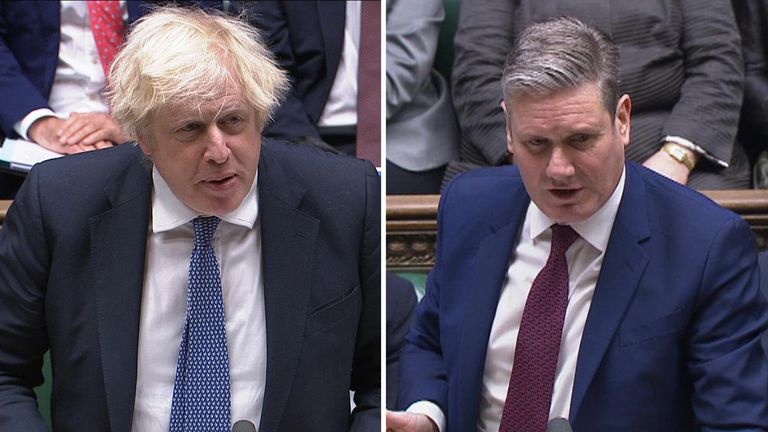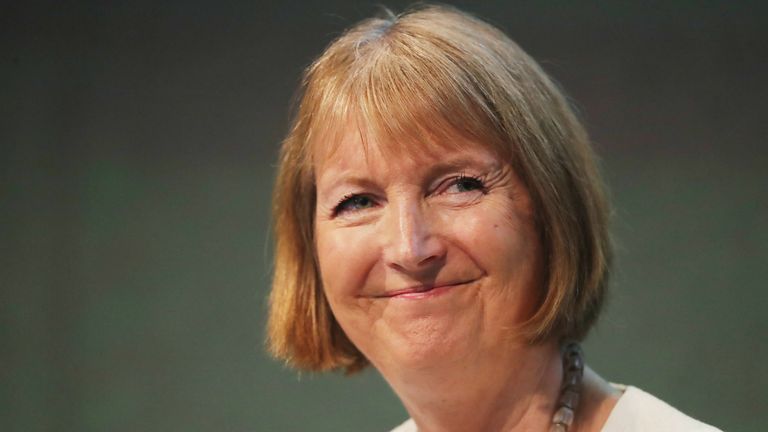It has been 11 months since the privileges committee launched its inquiry into Boris Johnson to establish if he misled parliament over lockdown parties in Downing Street.
Having collected written evidence, oral hearings are set to begin this month, and we will be able to watch live while senior figures are questioned about who knew what and when as the partygate scandal played out.
On Friday, the committee published its initial report, saying the Commons may have been misled multiple times.
This is everything you need to know about the investigation.
How did the inquiry come about?
The end of 2021 saw a deluge of stories about rule-breaking gatherings in Number 10 and around Whitehall during the COVID pandemic.
As report after report dropped, question upon question was asked by MPs in the Commons about who was involved – and many of them were directed at the prime minister.
Mr Johnson repeatedly denied any COVID rules were broken in Downing Street.
But in April 2022, after an investigation by police and senior civil servant Sue Grayit was confirmed a raft of gatherings had taken place.
Who is Sue Gray? The ex-partygate investigator picked as Starmer’s chief of staff
A total of 126 fines were issued by the Metropolitan Police, including to the prime minister, his wife Carrie Johnson and then-chancellor Rishi Sunak.
MPs from all sides of the Commons questioned whether Mr Johnson had misled the Commons over what he knew – a serious breach of parliamentary rules – and they voted in favor of the privileges committee carrying out an inquiry.
Mr Johnson said he had “absolutely nothing, frankly, to hide”.
What did Boris Johnson say in parliament?
Mr Johnson was first asked about partygate stories on 1 December 2021 when facing Labor leader Sir Keir Starmer at Prime Minister’s Questions.
“As millions of people were locked down last year, was a Christmas party thrown in Downing Street for dozens of people on 18 December?” Sir Keir asked.
The then-PM replied: “What I can tell the right honorable and learned gentleman is that all guidance was followed completely in Number 10.”
Pushed again by the then-Westminster leader of SNP, Ian Blackford, Mr Johnson accused him of “talking total nonsense” about parties.
Come PMQs on 8 December, Mr Johnson kicked off the questioning with a statement after a video surfaced of Number 10 staff joking about a Christmas party.
He said he “shared the anger” of the public and was “furious” to see the clip, adding: “I apologize unreservedly for the offense that it has caused up and down the country, and I apologize for the impression that it gives.
“I repeat that I have been repeatedly assured since these allegations emerged that there was no party and that no COVID rules were broken – that is what I have been repeatedly assured.”
Mr Johnson also accused both Labor and the SNP of “playing politics” when he faced questions about the video from both party leaders.
He was then asked by Labor MP Catherine West: “Will the prime minister tell the House whether there was a party in Downing Street on 13 November?” – a date when two parties were reported to have taken place, at least one of which resulted in fines.
Mr Johnson replied: “No, but I am sure that whatever happened, the guidance was followed and the rules were followed at all times.”
Who is conducting the investigation?
The privileges committee is made up of seven MPs – four Conservatives, two from Labor and one from the SNP.
The MPs are voted into the committee by their colleagues and reflect the political make-up of the House.
Labour’s Sir Chris Bryant usually chairs the committee, but recused himself from this investigation as he had already made a number of public comments about the matter.
Instead, senior Labor backbencher and mother of the House Harriet Harman will take his place.
What will the inquiry involve?
The committee has been gathering and analyzing written evidence after issuing a public call for it last summer.
It also requested evidence from Downing Street with a deadline of July last year, although it did not get that material until November.
The next step is to take oral evidence from those involved.
Politics live – Boris Johnson hits out in length statement after latest update from partygate inquiry
The committee has confirmed Mr Johnson will be called to appear in the week beginning 20 March, but it has not yet announced which other individuals will be questioned.
It has confirmed the hearings will take place in public to make sure the probe is “transparent”, although requests to hear evidence anonymously or in private “will be considered on a case by case basis”.
After hearing all of the evidence, the committee will compile a report of its findings.
What powers does the committee have?
Technically, the only powers the committee has is to issue that report to the Commons for MPs to consider.
In its findings, it can conclude that an individual has been found to have “committed a contempt” in misleading the House and it can recommend sanctions, ranging from an oral or written apology through to suspension for a specified period or even expulsion from the Commons .
But it will fall to MPs to decide whether to accept the findings of the report and to follow through with any sanction.
If MPs agree to a suspension of 10 sitting days or 14 calendar days upwards, it would trigger a recall petition for Mr Johnson, allowing his constituents in Uxbridge and South Ruislip to vote on whether to hold a by-election for his seat.


